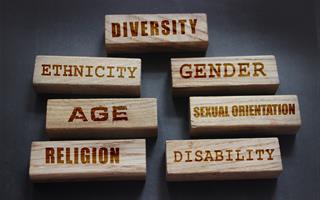Dr Clare Mills shares CFG's ongoing EDI work and explains why CFG is making changes to make its events and speaker panels as inclusive as they can be.

I have no idea if we are an early adopter or late to the party with a new process we’ve just introduced at CFG. But it feels like an important step, so I’m writing about it. I’d love to know if your organisation does this, is considering this, or has ruled this out – and about what you think.
We’ve spent a lot of time planning and preparing for our Annual Conference 2022 on 30 June (tickets still available!) and bringing in a thought-provoking, informative and interesting set of speakers and panellists.
Aware of the importance of inclusion and diversity, we try hard to ensure we have people from a range of genders and ethnicities – it’s a long time since the start of the #NoMoreManels and #NoMoreWanels campaigns, calling for an end to all male and/or all white panels at conferences and events.
Here at CFG, we’re committed to ensuring that our organisation is welcoming to everyone. We want to make sure that our organisation, events and services are accessible to all, regardless of gender, ethnicity or nationality, disability, religion, sexual orientation, gender reassignment, socioeconomic background or age.
This covers many aspects, from staff and trustees to speakers and panellists at our events and training courses (online and in-person). We want to ensure a welcoming, safe environment where everyone feels included and confident that their time with CFG will be free from harassment, unfair and unlawful discrimination, and in a space where everyone is treated fairly.
Lately I’ve been thinking about visible and hidden diversity. Having a trans child (a grown up one) I’m acutely aware that you can’t tell much about people just by looking at them. Intersectionality, or deep diversity, recognises that multiplicity and reminds us that people must not be reduced to a single, visible characteristic.
So, what can we do to learn more and understand better whether we are making progress towards being more inclusive?
My recent experience of job-hunting in the charity sector included completing diversity monitoring forms alongside applications. Analysis of that data is helping charities understand whether their recruitment practices are attracting applicants from diverse backgrounds and communities. It’s helped charities draw up a baseline and then change practices to attract a more diverse range of candidates.
If we can do this for recruitment, we can do this for speakers and panellists at our events. At CFG we want to know whether we are finding speakers and panellists and we need to start with a baseline.
So, starting from now, we are asking all our speakers and panellists to help us, by providing anonymous data on diversity. Initially, we’re asking about age, sex and gender identities, ethnicity, disability, caring responsibilities and socio-economic background. We will use the data gathered to review our processes in finding and offering speaking places, to ensure they are fair and transparent, and do not have an adverse impact on any particular group.
We recognise that some people may regard this information as private and we include the option of ‘prefer not to say’ in all categories. We will only publish our analysis of the data to show where we have made progress and where we have more work to do – and we’ll never publish data that allows individuals to be identified.
One final thing: this isn’t an end point. We know there will be more work to do – to make progress on inclusion and dismantling systemic barriers – and that we also need to think about diversity in relation to participation at our events and training sessions, as well as our member organisations.
I hope you’ll encourage CFG and let me know if you have more thoughts on what we could be doing. If you’d like a copy of our diversity monitoring questionnaire, or if you want to have a chat about this in more detail, please do email me.
Looking to improve your charity finance skills, keep abreast of the latest thinking and network with your peers? Check out our latest events and training courses!